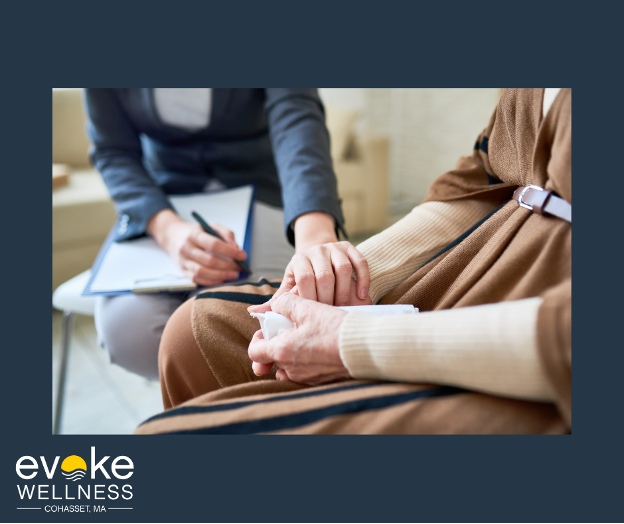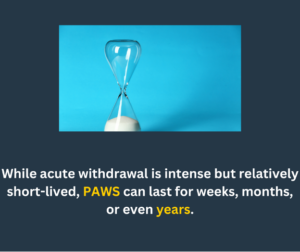As you continue down the road to recovery, it is important to understand that the journey does not end once acute withdrawal symptoms subside. Many people experience post acute withdrawal syndrome, a prolonged period of psychological and physiological readjustment. Knowing what to expect during this challenging transitional phase empowers you to proactively manage symptoms and avoid relapse. Within post acute withdrawal syndrome lies common symptoms such as anxiety, fatigue and cravings. Some people require the use of certain medications like Ativan to alleviate discomfort during withdrawal–but one should note the inherent risks involved. Arm yourself with information to navigate the ups and downs of post acute withdrawal and remain firmly on the path to sobriety. If this resonates with you or a loved one, take the first step toward recovery and call us at (617) 917-3485 today or reach out online.
What Is Post Acute Withdrawal Syndrome?
Post acute withdrawal syndrome (PAWS) refers to a set of symptoms that can persist long after the initial acute withdrawal phase.
Symptoms
Common PAWS symptoms include anxiety, insomnia, fatigue, difficulty concentrating, and mood swings. These lingering effects can make the recovery journey challenging. If you or a loved one is experiencing one or more of these symptoms, you may require an acute detox program.
Causes
The exact causes are not fully understood, but PAWS is believed to be related to changes in brain chemistry and function during addiction. As the brain heals and neurotransmitters rebalance, PAWS symptoms may arise. While acute withdrawal is intense but relatively short-lived, PAWS can last for weeks, months, or even years
Management
Coping strategies like counseling, support groups, exercise, and stress management techniques can help manage PAWS symptoms. Patience and perseverance are key, as symptoms typically improve over time.
How Will Ativan Help With PAWS?
Alleviating Anxiety & Insomnia
Ativan (lorazepam) can provide relief from anxiety and insomnia – two of the most common PAWS symptoms. Its calming effects allow your mind and body to relax, promoting better sleep. This gives your brain the downtime needed to start rebalancing itself during recovery.
Reducing Irritability
PAWS often brings feelings of restlessness, agitation and irritability. Ativan’s anti-anxiety properties can help take the edge off, making it easier to cope with everyday stressors without relapsing,
Easing Muscle Tension
Lingering muscle aches and tension are also frequent PAWS complaints. As a muscle relaxant, Ativan can ease that physical discomfort so you feel more at ease.
How Fast Does Ativan Work for Anxiety During PAWS?
Ativan (lorazepam) is a fast-acting benzodiazepine that can provide rapid relief from anxiety symptoms during post-acute withdrawal syndrome (PAWS).
Onset of Effects
The calming effects of Ativan typically begin within 20-30 minutes after taking the medication. For anxiety relief during PAWS, the onset may be even quicker due to increased brain sensitivity.
Duration of Action
Ativan has an intermediate half-life of 10-20 hours, providing extended anxiety relief compared to shorter-acting benzos. However, rebound anxiety can occur if stopped abruptly after regular use.
Dosing Guidelines
Ativan is usually prescribed in low doses of 0.5-2mg 2-3 times daily as needed for anxiety during PAWS. Dosage is individualized based on symptom severity and response.
Is Ativan Addictive?
Potential for Addiction
Yes, Ativan (lorazepam) can be addictive. As a benzodiazepine, it has the potential to cause physical and psychological dependence with prolonged use. The risk increases with higher doses or when combined with other depressants.
Managing the Risks
However, when taken exactly as prescribed for short periods, Ativan addiction is less likely. Slowly tapering off under medical supervision helps minimize withdrawal symptoms. Cognitive-behavioral therapy can also help prevent misuse and addiction.
What Are the Side Effects of Ativan?
Common side effects of Ativan (lorazepam) include drowsiness, dizziness, and lack of coordination. More serious risks involve respiratory depression, impaired mental/motor functions, and increased risk of falls or accidents.
Potential Adverse Effects
- Fatigue and lethargy
- Slurred speech
- Vision problems or blurred sight
- Headaches or migraines
- Nausea or vomiting
Withdrawal Symptoms
Abruptly stopping Ativan after extended use can trigger withdrawal effects like anxiety, insomnia, tremors, and seizures. Tapering off slowly under medical supervision is crucial to avoid severe complications.
Interactions & Contraindications
Ativan may negatively interact with other drugs like opioid painkillers, antidepressants and anticonvulsants. It should be avoided by those with acute narrow-angle glaucoma, severe liver disease or sleep apnea.
What Precautions Should I Take When Using Ativan for PAWS?
Monitor Side Effects
Ativan (lorazepam) can cause side effects like drowsiness, dizziness, and headaches. Be cautious when driving or operating machinery. Avoid alcohol, as it increases Ativan’s sedative effects.
Follow Dosage Guidelines
Take Ativan exactly as prescribed. Never increase the dosage or take it more frequently without consulting your doctor. Doing so raises the risk of dependence and severe withdrawal symptoms.
Seek Support
Consult your doctor or therapist regularly while taking Ativan for PAWS. They can monitor your progress, adjust dosages if needed, and recommend lifestyle changes or additional treatments.
What Drug Interactions May Occur With Ativan?
Benzodiazepine Risks
Ativan (lorazepam) is a benzodiazepine that can potentially interact with other medications. Be cautious when combining it with opioid painkillers, sleep medications, or anti-anxiety drugs – the effects may be dangerously amplified. Furthermore, when tapering off this medication, one might consider a benzo detox program to ensure it is done safely. These programs are tailored specifically to manage severe withdrawal symptoms.
Alcohol Warning
Avoid alcohol entirely while taking Ativan. Alcohol increases the sedative effects, leading to excessive drowsiness, dizziness, and potential breathing problems. This combination can be life-threatening.
Common Interactions
Some common drugs that may negatively interact with Ativan include antidepressants, antihistamines, barbiturates, and anti-seizure medications. Always disclose your full medication list to your doctor and pharmacist.
The key is to take Ativan exactly as prescribed and be vigilant about potential interactions. With proper precautions, you can minimize risks during your recovery.
Overdose Risks With Ativan
Ativan (lorazepam) is a potent benzodiazepine that can slow breathing and brain activity when taken in excessive amounts. The risk of overdose rises significantly when combined with other central nervous system depressants like alcohol or opioids.
Recognizing the Signs
Be alert for overdose symptoms such as:
- Extreme drowsiness
- Confusion and dizziness
- Slow or shallow breathing
- Blueish tint to lips/fingernails
Getting Immediate Help
If an overdose is suspected, call 911 right away. Remain calm and try to keep the person awake and breathing until emergency services arrive. Quick action could save a life.
FAQ: What Is the Best Treatment for Post Acute Withdrawal Syndrome?
Holistic Approach
The most effective treatment combines medication, individual therapy programs, and lifestyle changes. Medications like ativan can ease symptoms, while cognitive behavioral therapy addresses underlying issues.
Healthy Habits
Developing healthy habits is crucial – eating a nutritious diet, exercising regularly, practicing mindfulness, and getting adequate sleep. Building a strong support system is also beneficial.
Professional Help
Working closely with addiction specialists, counselors, or even group therapy programs ensures you receive personalized care. Be patient as recovery is an ongoing process requiring commitment.
Conclusion
Ultimately, post acute withdrawal syndrome can be a challenging obstacle on the road to recovery. With patience, compassion, and the guidance of professionals, you can develop coping strategies to manage symptoms and continue making progress. Setbacks are normal, so focus on celebrating small victories and milestones. Surround yourself with a strong support system, and do not lose sight of how far you’ve come. Recovery is a journey filled with ups and downs, but you have the inner strength to push through the difficult times. Take things one day at a time, focus on self-care, and trust that it does get easier. Stay committed to your health and wellbeing, and remain hopeful for the bright future ahead. You’ve got this.
Begin Your Journey with Evoke Wellness at Cohasset
If you or a loved one is considering treatment, Evoke Wellness at Cohasset invites you to contact us. Our compassionate team is ready to answer your questions, discuss your needs, and help you take the first steps toward recovery. In Cohasset, you’ll find more than just a treatment program – you’ll discover a community dedicated to your wellness and success. Together, let’s embrace the journey to recovery and the promise of a new beginning. Call us at (617) 917-3485 today or reach out online.





